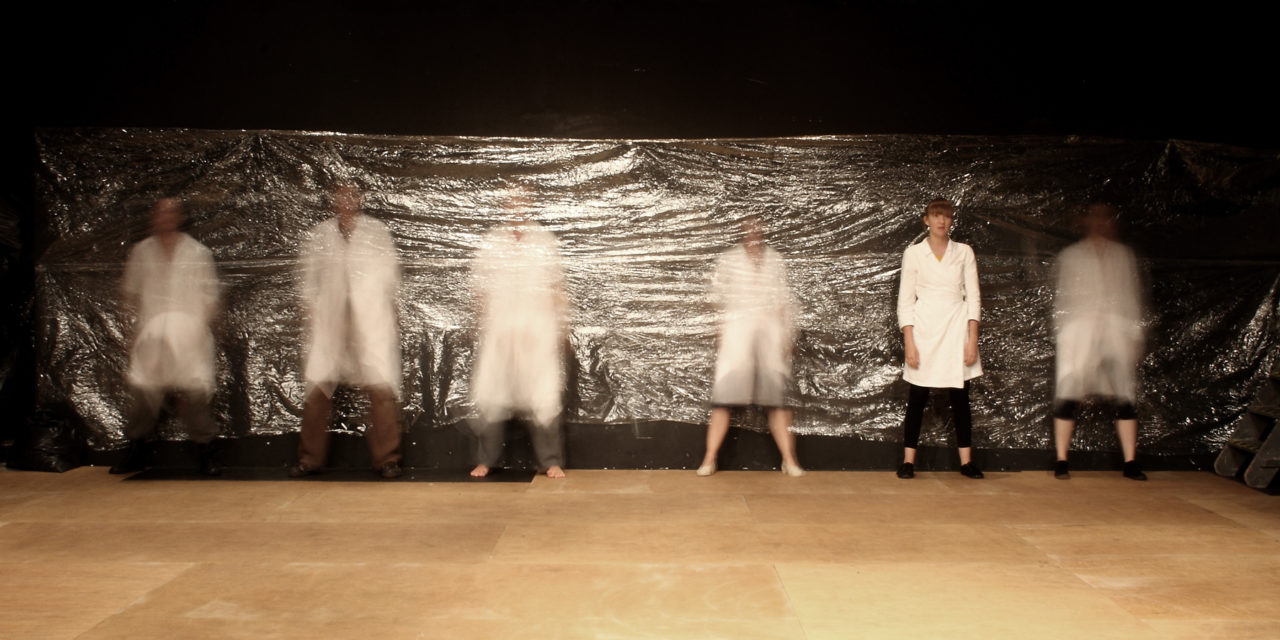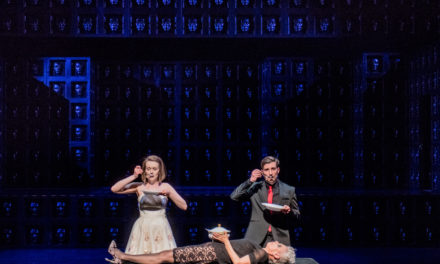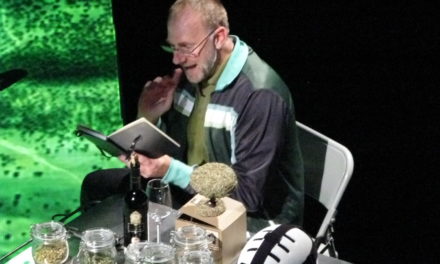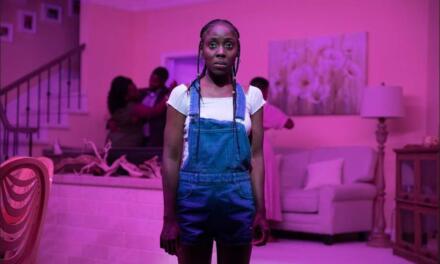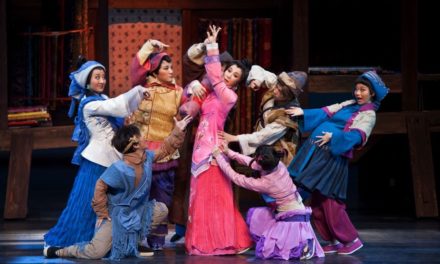American writer/director, Dara Weinberg, live-blogs for TheTheatreTimes.com from Teatr Chorea’s “Retro//Per//Spectives” fesitval in Łódź, Poland, held in August. This is the first post in the series.
Introduction
The infamous Jerzy Grotowski (1933-1999), mercurial, venerated theatre shaman, awed and aggravated artists from his native Poland to Italy to India to Irvine, California. Many of Poland’s artists are colored by the legacy he left: sweat-drenched actor training, acrobatics of body and voice, emotional intensity, unearthing ancient and folk music, and, in many cases, socially conscious or community-based work.
Grotowski’s long shadow, even after his death, can obscure the daughter and granddaughter ensembles in Poland today. But these younger post-Grotowski companies, scattered from Warsaw to Wrocław, are not historic reenactors: they are carving out their own identities, and using Grotowski’s techniques for their own purposes. The history is hard to shake off though. Łódź’s Teatr Chorea — at 10 years old, one of the newest of the bunch—even made a piece called “Grotowski: an attempt to retreat.”
Teatr Chorea
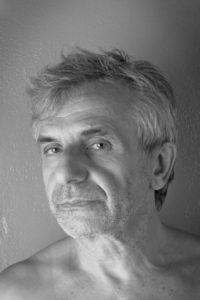
Tomasz Rodowicz, the Artistic Director of Teatr Chorea. Photo by Pola Amber.
Teatr Chorea, the subject of this series, was spawned from one of the first post-Grotowski companies—Theatre Association “Gardzienice,” named for a small village outside Lublin, in the east. Gardzienice famously rehearsed at nighttime, often running through the hills and woods. (One strain of Grotowski’s work often found itself outdoors, inhaling nature, or wandering through villages collecting songs.) But Professor Dariusz Kosiński has argued that, for the newest companies, a turn away from the rural has occurred. The granddaughter ensembles are going into the cities.
Many of Chorea’s actors, and director Tomasz Rodowicz, came through or from Gardzienice, but the company has now settled in the stark concrete landscape of Łódź, a flat post-industrial town of about 700,000 people with similarities to Detroit. Far from the foggy, mountainous landscape of rural eastern Poland, Chorea now reflects its urban environment in its work. They include Łódź children and teenagers in their workshops and choruses. Some of their work, such as 2012’s Szpera ’42, about the liquidation of the Łódź ghetto, has explored the city’s troubled history.
The name “Chorea” is taken from the Latinized version of the term for the unity of text, music and dance symbolized by the ancient Greek chorus. Nearly all of their pieces relate to this idea of choral performance. As a Greek chorus obsessive, after I discovered Chorea in 2011, I spent two years hanging around, writing about them, and squirrel-hoarding notes on their work. I even found myself singing in the choir for several of their productions; I am far from being a neutral observer.
Oratorium Dance Project
The first Chorea production I saw, in 2011, was Oratorium Dance Project . The atmosphere in Łódź at that time was an ebullient, inclusive party, in which even the most detached researcher-journalist might have found him or herself putting down the notebook and joining the dance. Oratorium, which I have written about here, was a superchorus of over a hundred community-based singers and dancers, combined with Chorea’s professionals and the Łódź Philharmonic, cavorting with ancient Greek texts. Oratorium was also significant in that two of the young Chorea composers—Tomasz Krzyżanowski and Maciej Maciaszek—wrote all of the music. Some of it was adapted from fragments of ancient Greek song, but most were their own. Oratorium was a far cry from the post-Grotowski tradition of repurposing folk melodies; this was an original, self-contained musical achievement, a turning point in the evolution of these companies.
I moved to Łódź, eager to find out how the company would continue its trajectory. But the size and ambition of the project made following up difficult. Oratorium, though beloved, was expensive to remount. The exhausted directors weren’t in a rush to commit to another project requiring hundreds of people on stage at every rehearsal. So, after one more gasp of the Greeks (a 2012 adaptation of Euripides’s Bacchae, called Bachantki) a practical fragmentation occurred within the chorus.
The young teenage and college-aged performers who had been drawn into Chorea’s orbit by Oratorium continued to meet regularly, for training and to develop new pieces. But the singers often met separately from the dancers, and the most experienced actors separately from both. There was some overlap—individual performers participated in multiple groups, singers accompanied dancers, etc.—but the final performances were more like potsherds than a cohesive Grecian Urn.
“Art radiates”
This article is the beginning of a live-blog I will be writing about Chorea’s recurring festival, Retro//Per//Spectives, held in Łódź in August. The RPS festivals feature all of the new pieces which Chorea has created over the previous two years, as well as performances from invited international guests. This is an opportunity to review the results of the artistic fragmentation within the company, and see new premieres from the different choruses.
For example, the first day, August 21, contains a showing of the work-in-progress Vidomi, from choreographer Janusz Adam Biedrzycki, a community-based dance collaboration with blind and visually impaired Łódź residents, and Rytm języka (Rhythm of language), from composer Tomasz Krzyżanowski, a new collection of Doppler-effect polyrhythms and melodies from the singers. Biedrzycki and Krzyżanowski are Chorea veterans, but some of their cooperating artists for these projects are young students, who have only been with the company since Oratorium.
This year’s festival theme is “Sztuka promienuje” (“Art radiates”), graphically represented in luminescent green and orange over purple. Last week, to promote the festival, Chorea artists dressed in mock radiation suits, spray-painted the logo on poster poles, and put festival-branded caution tape around the city. Director Tomasz Rodowicz said, in a recent interview, “We want to break down stereotypes about the elitism of art and reach people who are not familiar with art, who do not attend the theatre. If you do not somehow draw their attention to art, on the street, through a happening on an ordinary Monday, for example, then they will never find their way to the theatre.”
In Chorea’s opinion, art should radiate from the rehearsal room, the studio and the orchestra, and seep into the audience and the community. It should invite community members, children, and students, some with no training in music or dance, to join the choruses. It should pollinate the stones of a flat concrete city. It should spread, with the kind of contagious influence of Jerzy Grotowski’s own work, as far as it can.
Saturday, August 16, 2014 (Five days before the festival starts) – Łódź, Poland
Earlier this morning, when I left the apartment block to stock up on cereal and bread (supplies for festival survival) it was raining gently and constantly. Now, at 9 AM, the rain has stopped, but the sky is a soppy grey. I have one hour to get to rehearsal at a new building, the Art_Inkubator, in a restored factory.
This city was once known for being a multicultural center of industry. Andrzej Wajda’s 1975 film The Promised Land, based on the novel by Władysław Reymont, dramatizes the frenetic heydey of the nineteenth-century time of “four cultures”—Poles, Jews, Germans, and Russians—when the booming textile industry made some men wealthy and maimed others in industrial accidents. Those days have left the city a legacy of ornamented buildings, many of which are falling apart.
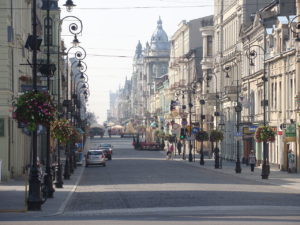
Ulica Piotrkowska in Łódź. Photo by MAx 92.
Some of the textile barons’ ornate townhouses on Piotrkowska Street have been restored; others are shrouded in a kind of green-black mesh to prevent falling chunks of stone from killing a passerby. Some hulking brick factories have been transformed into facilities for other kinds of production, such as the giant Manufaktura mall, or my destination today, the retrofitted Art_Inkubator. Others sit with broken glass in the windows. There seems no end to this city’s supply of brick and stone—some of it renovated, much of it still wrecked.
I ride the #98 bus down Piłsudskiego Street. It’s a pretty route, especially in summer—Poland is full of weeping willows—but construction on the central tram line means much of the city is obscured by dump trucks, cranes, and piles of displaced dirt. It looks as if the street is clawing its own innards out, trying to dig up its layered and troubled past.
Fabryka Sztuki and the Art_Inkubator
![Fabryka Sztuki [the Art Factory] in Łódź. Photo by Krzysztof Szymczak.](https://thetheatretimes.com/wp-content/uploads/2014/08/553a24fe21968_o-300x200.jpg)
Fabryka Sztuki [the Art Factory] in Łódź. Photo by Krzysztof Szymczak.
I turn left on Tymienieckiego Street and pass under bushy summer trees, on my way to the familiar old bricks of Fabryka Sztuki (the Art Factory) and the brand-new, hulking bricks of the Art_Inkubator. It’s time for a brush-up rehearsal on Gilgamesz, one of composer Tomasz Krzyżanowski’s post-Oratorium opuses.
In the tiled courtyard, between the brick cubes, singers are gathering—Joanna Kłos and Sandra Gierzek, joined-at-the-hip teenage friends from Oratorium—Justyna Sobieraj-Bednarek, a doctoral student at Łódź’s Academy of Music—the energetic Maja Justyna, who leads us in a yoga warm up despite having given birth three months ago. I greet old friends and ask them about the upcoming premieres. They mention the complexities of Rhythm of language–I will hear from several folks that the polyrhythms it includes are even harder than those in Gilgamesz.
Working with Teatr Chorea
We make our way upstairs to one of the new spaces. It’s an enormous room, wide as the whole Inkubator. Unvarnished wood speckled with steel poles. New paint and colorful logos have given this industrial space a makeover. But it feels empty. One of the things that is going to happen in this festival is that the Art_Inkubator will be vigorously initiated into Dionysos’s rites. The building will be crawling with visitors and workshoppers, hosting three or more performances every night; it will become a real theatre.
In a circle of chairs around Tomasz Krzyżanowski’s yellow harmonium (he bought it in India on a tour of Grotowski: an attempt to retreat), the thirteen of us begin to sing. When choir director Jakub Pałys—the person who first invited me to an Oratorium rehearsal almost three years ago—tries to help me adjust my voice, which is sounding breathy and weak, I start sobbing. Sometimes the Chorea tightrope is too much for me—wavering between observer and performer, the US and Poland, I lose my footing. I’ve had a vicious summer cold for three weeks. My throat feels like a wall covered with graffiti.
But despite my wavering, the energy of the chorus sweeps me up. I find myself singing for seven hours. Sniffling, but singing. This has happened to me before with Chorea: I come into their room, feeling inadequate as an individual, and leave remembering that I am part of the group. This sensation of belonging is part of what made Grotowski’s methods so adored by performers. Some of that power—the sense of being part of something larger than yourself—still “radiates” through Chorea.
“Change is always good…”
One of the singers from Warsaw, Dominika Jarosz, walks back with me on Piotrkowska. She tells me (I am worried about the future, as usual) that change is always good. Is it? She says it so convincingly.
All throughout the city, artists are arriving. From Kraków, from Lublin, from Gdańsk and Warsaw; from Norway, the Czech Republic, Israel, and Belarus. Our rehearsal on the top floor of the Art_Inkubator is being replicated in every room in the building, as over twenty performances are staggering to their legs at once. Many of the performers are running from one rehearsal to the next. Students, free from the university for the summer, are stretching on wood and Marley floors. People are taking time off from work, neglecting their boyfriends, and sinking into the whirlpool of Retro//Per//Spectives.
Oratorium may have fragmented into sub-choruses, but this festival is all about unity—about people and performances coming together. It begins on Thursday. I have a few more days to get my voice in shape.
Dara Weinberg is a writer/director, originally from Los Angeles. She studied Polish theatre on a Fulbright grant from 2011-2013; she now lives in Kraków. She is working on a book about her experiences with Poland, theatre, and Teatr Chorea. Her libretto for the opera Penny, with music by Douglas Pew, will premiere in January 2015 at the Washington National Opera / Kennedy Center, as part of the American Opera Initiative.Website: http://darastrata.com/ Photo by Dara Bramson
This post was written by the author in their personal capacity.The opinions expressed in this article are the author’s own and do not reflect the view of The Theatre Times, their staff or collaborators.
This post was written by Dara Weinberg.
The views expressed here belong to the author and do not necessarily reflect our views and opinions.

